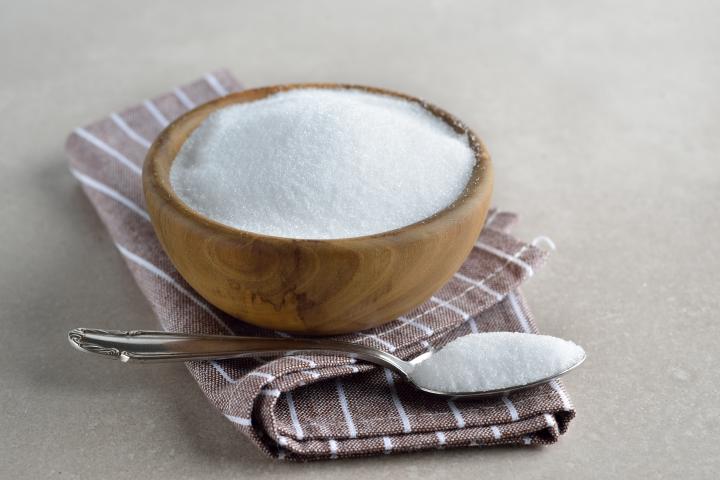By Chinasaokwu Helen okoro
Consuming foods that contain erythritol, a popular artificial sweetener and common ingredient in keto diet products, increases the risk of heart attack and stroke, a new Cleveland Clinic study warns.
Erythritol makes platelets in the blood more active, which may lead to blood clots, researchers explained Thursday in the journal Arteriosclerosis, Thrombosis and Vascular Biology.
Consuming foods that contain erythritol, a popular artificial sweetener and common ingredient in keto diet products, increases the risk of heart attack and stroke, a new Cleveland Clinic study warns.
Consuming foods that contain erythritol, a popular artificial sweetener and common ingredient in keto diet products, increases the risk of heart attack and stroke, a new Cleveland Clinic study warns.
olyina – stock.adobe.com
“This research raises some concerns that a standard serving of an erythritol-sweetened food or beverage may acutely stimulate a direct clot-forming effect,” said study co-author Dr. W. H. Wilson Tang, research director for Heart Failure and Cardiac Transplantation Medicine at Cleveland Clinic.
Tameika Gentles, who describes herself as a holistic weight loss coach, says she only eats one “fun” meal a week, avoids mindless snacking and limits her sugar and alcohol intake.
I’m a weight loss coach — here’s how I lost 100 pounds and kept it off
How a keto diet can harm your health: ‘May not suit everyone’
Lance Bass revealed last week he has latent autoimmune diabetes of adults after being misdiagnosed with Type 2 diabetes. Here’s what to know about LADA.
What is Type 1.5 diabetes? All about Lance Bass’ autoimmune disease
The US Food and Drug Administration classifies erythritol as a GRAS (“generally recognized as safe”) ingredient and permits the use of it without restriction.
Erythritol is low in calories and about 70% as sweet as sugar.
3
Erythritol is low in calories and about 70% as sweet as sugar.
So Nourished
Synthesized from corn, found naturally in some fruits, and produced by the body in very small amounts, erythritol is low in calories and about 70% as sweet as sugar.
It adds bulk to monk fruit and stevia sweeteners, provides a crispy texture to baked goods and leaves a cooling aftertaste.
We know too much sugar is bad for us — now, researchers from the University of California, San Francisco say that even when we eat healthfully, each gram of added sugar ages our cells.
Here’s what you need to eliminate from your diet to lower your biological age
Unfortunately, erythritol is poorly metabolized by the body and it can accumulate.
Past research by Cleveland Clinic found that people at greater risk for heart disease were twice as likely to experience a major cardiac event in three years if they had high erythritol levels compared to low levels.
“Many professional societies and clinicians routinely recommend that people at high cardiovascular risk — those with obesity, diabetes or metabolic syndrome — consume foods that contain sugar substitutes rather than sugar,” senior and corresponding author Dr. Stanley Hazen said.
“These findings underscore the importance of further long-term clinical studies to assess the cardiovascular safety of erythritol and other sugar substitutes,” added Hazen, chair of Cardiovascular and Metabolic Sciences in Cleveland Clinic’s Lerner Research Institute and co-section head of Preventive Cardiology.
Heart disease is the leading cause of death in the US and around the world.
Heart disease is the leading cause of death in the US and around the world.
lovelyday12 – stock.adobe.com
This new study focused on healthy adults.
Those who consumed an erythritol dose that would be in a muffin or sugar-free soda showed a significant increase in blood clot formation while those who ate sugar did not.
Cardiovascular disease builds over time, and heart disease is the leading cause of death globally. We need to make sure the foods we eat aren’t hidden contributors,” Hazen said.
But in a statement released Thursday to The Post, the head of an organization that represents the low- and reduced-calorie food and beverage industry raised issue with the study’s “extremely small sample size” and lack of consideration for the participants’ lifestyle choices.
“For more than 30 years, global authorities have repeatedly confirmed the safety and efficacy of erythritol and other low and no-calorie sweeteners,” said Carla Saunders, president of the Calorie Control Council.
Hazen’s team also recently determined that high amounts of xylitol — a sugar alcohol like erythritol that’s found in sugar-free candy, gums, baked goods and toothpaste — increase the risk of heart attack and stroke.
“I feel that choosing sugar-sweetened treats occasionally and in small amounts would be preferable to consuming drinks and foods sweetened with these sugar alcohols, especially for people at elevated risk of thrombosis such as those with heart disease, diabetes or metabolic syndrome,” Hazen advised.


